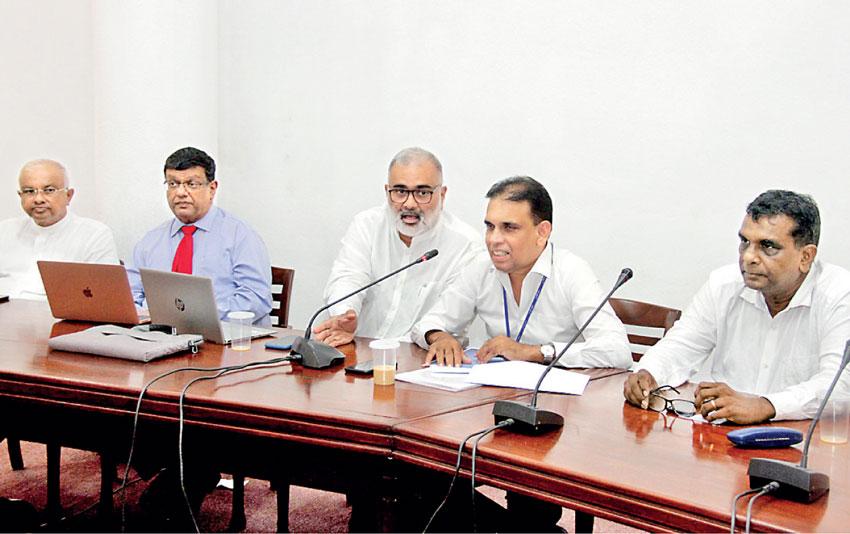Reply To:
Name - Reply Comment

SLAITO President Nishard Wijetunga (third from left) addresses media while committee members (from left) Rohan Abeywickrema, Mahen Kariyawasan, Nishad Wijetunga, Nalin Jayasundera and Devindre Senaratne look on
PIC BY PRADEEP DILRUCKSHANA
By Shabiya Ali Ahlam
The Sri Lanka Association of Inbound Tour Operators (SLAITO) yesterday cautioned on the fresh move made by the government and some tourism industry stakeholders to reintroduce the minimum room rate (MRR), asserting it could do more harm than any good to the industry.
The SLAITO highlighted that with the new MMR that will be effective from August 1, Sri Lanka could become a destination with possibly the highest room rates.
The eventual outcome of it will be tourists being driven away from visiting the island nation and opting for countries with attractive accommodation rates that offer value for money.
Under the new plan, the MRR for five-stars will be US $ 130++, for four-stars US $ 100 ++ and US $ 80 ++ for three-stars.
Looking at the five-star hotel room rates of competing nations, the average room rate in Bangkok is about US $ 84, in Malaysia, Kuala Lumpur, it is US $ 82, in Vietnam, Hanoi, it is US $ 115. In India, the five-star hotel room rates average at US $ 97 and in Dubai US $ 89.
“We are yet to know of a country that has an MMR imposed on the hotel sector. There is no need for the government to intervene in the hotel sector, which is entirely owned by the private sector.
Just because the room rates are increased, it does not mean that we will start catering to the high-end tourism segment. We need to have the product for that,” SLAITO President Nishard Wijetunga told reporters in Colombo, on Tuesday.
As efforts are underway to implement the MMR in hotels across the island nation, Wijetunga added that such a move would put Sri Lanka out of the competition altogether.
According to the SLAITO, the industry stakeholders were neither consulted nor included in the decision-making process by The Hotels Association of Sri Lanka, which presented the idea of the MMR to the Sri Lanka Tourism Development Authority (SLTDA) and then Tourism Minister Harin Fernando.
The SLAITO also pointed out that Fernando has been misinformed on the outcome of the MMR and to provide a clear picture, a discussion would be held in the coming weeks.
“All the work done by the minister so far will be undone with this move,” said Wijetunga. Earlier this week, SLTDA Chairman Priantha Fernando justified the imposition of the MRR, stating it is needed for Sri Lanka to be competitive in the global tourism sector. “We do have to compete with the other countries but you cannot sustain by selling a five-star room at US $ 60 per night. How do you expect to pay the staff and run a business? Everyone has their arguments but it’s for the sustainability of the business and industry,” he said. Sri Lanka previously had an MRR regime in place from 2010 but it was discontinued in 2019, after the Easter Sunday attacks.